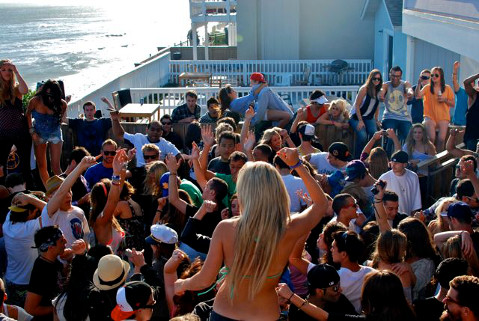Regulations Behind I.V. Party Life
Ordinances that Restrict Isla Vista’s Nightlife Stir Tensions

With the UCSB and SBCC school years in full swing — and Halloween rapidly approaching — I.V.’s party life is in high gear. But partying hallmarks such as booming music and copious amounts of alcohol come with a price, and in I.V., that price takes the form of a handful of county ordinances. Chief among these restrictions and regulations are the Nighttime Noise Restrictions (Sec. 40-2), Outdoor Festivals (Sec. 6-70), and Social Host Liability (Sec. 48) ordinances.
Starting at 10 p.m., Sunday-Thursday, and midnight, Friday and Saturday, the noise ordinance bans “loud and unreasonable” noises, such as amplified music. The festival ordinance is similar, but it applies only to I.V. and only on the evenings and nights of Halloween celebrations and the comparable block party Deltopia. The social host ordinance, on the other hand, holds those putting on parties responsible for allowing underage drinking. First-time violations result in fines ranging from $108-$500.
Enforcing these ordinances often reveals the differing attitudes and viewpoints residents, law enforcement, and county officials have when it comes to managing I.V.’s party culture. Many students believe they have a right to party to their liking in a student-dominated town and that these ordinances result in punishment-oriented policing that erodes trust in law enforcement. Police, on the other hand, view these restrictions as critical safety measures that limit the window in which alcohol-fueled crimes can occur.
As ubiquitous as noise citations seem to be, they make up a relatively low percentage of Isla Vista Foot Patrol’s write-ups, says the force’s lieutenant, Rob Plastino; a little less than a third of all citations given out on Friday-Saturday, October 9-10, for instance, were for violation of the noise ordinance.
While it’s pretty evident when there’s a noise or festival ordinance violation, nailing someone in violation of Social Host can be difficult. According to UCSB fourth-year Mathew Burciaga, underage drinking is so prevalent and customary that residents 20 and under — as well as their older beverage-providers — typically don’t worry about being singled out and caught.
“It’s kind of like that concept of herd immunity,” he says.
According to Plastino, 2015 has seen considerable improvement in residents’ compliance and a reduction in the number of citations the Foot Patrol has handed out since a particularly turbulent 2014. The single arrest made on October 10, he said, was “just unheard of” for a Saturday night in the fall. He credits this year’s progress to students’ educating themselves, UCSB’s efforts in I.V., and community activities that build relations between law enforcement and residents, such as the Soccer with a Cop event at a recent Saturday’s Meet Your Neighbors Day.
Despite these improvements, however, many still view the ordinances as unproductive slaps on the wrist rather than suitable remedies to deeper problems underlying much of I.V.’s party culture. I.V. is too unique demographics- and culture-wise to have its lifestyle problems regulated by ordinances that apply to all the rest of the county, says Jacob Lebell, a recent UCSB graduate who serves on the Isla Vista Recreation and Parks District board and has lived in the town for most of his life. For him, the ordinances haven’t been inherent failures in regulating noise and underage drinking, per se, but result in policing “centered on giving out fines for these minor infractions instead of looking at the problems in the community as a collective and holistic whole.”
One new and promising policing tactic pioneered at this past spring’s Deltopia utilized student volunteers to warn revelers that the festival ordinance was about to take effect. This somewhat-softer strategy proved “phenomenally successful,” said Plastino, and Burciaga, who attended a party visited by one of these students, recalls partiers’ appreciation for the warning from their peers.
For those like Plastino and Lebell, common ground is found most in the belief that greater community involvement and input in crafting the laws that regulate I.V. life is a key ingredient to better student–law enforcement relations as well as an essential step in tailoring ordinances to the community’s needs. I.V.’s vote next year on whether or not to establish a community service district gives some like Lebell hope for future change.
“My thinking and really my hope with AB 3,” he said, “is … that it’s going to give us more of a voice, more of a kind of central community discussion from which we can partner and really negotiate and be on a much more even and constructive and collaborative playing field.”



